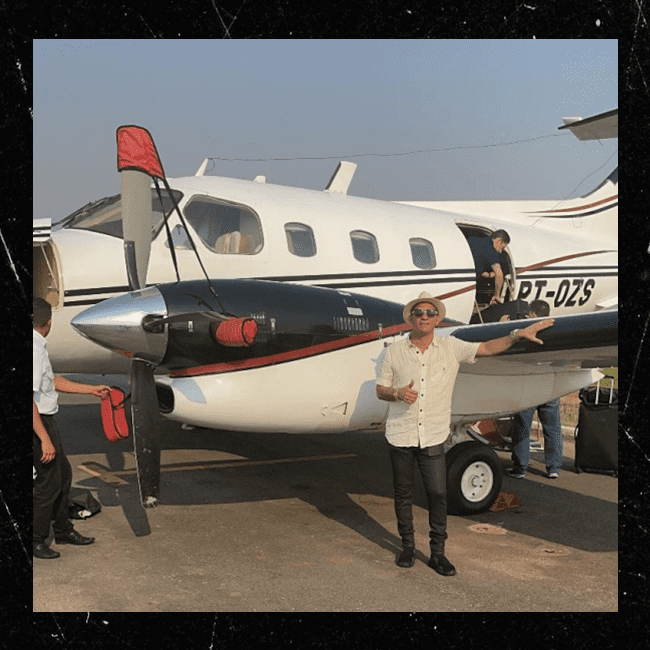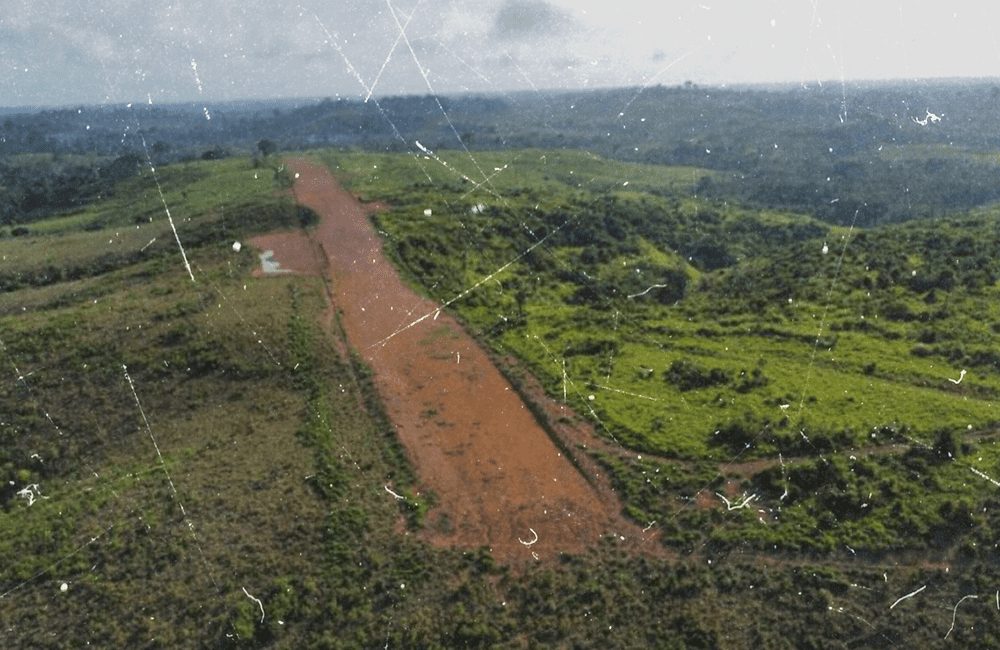The police say that the group led by Grota illegally moved around R$1 billion in Pará between 2017 and 2020. To launder the money from drug trafficking, he allegedly used aliases and front companies to buy and sell farms, cattle, gold mines, and machinery used for gold extraction.
Convicted at first instance in Maranhão and imprisoned in June 2018 for leading a militia group of military police officers – accused of drug and arms trafficking, as well as bank robberies – Grota was released on bail in October of that year. In another case in the same state, Grota appears as a defendant for murder.
Still in 2018, Grota settled in Itaituba as a cattle rancher and gold investor. In a short time in “Gold City”, he became rich. With no assets declared in 2019, he reported R$14 million the following year to the Brazilian IRS, according to the police investigations seen by Repórter Brasil.
His assets include a mining company, as well as illegal mining sites, farms, and aircraft. One of the group’s Cessna planes appeared in three different police operations involving money laundering and the transportation of gold, cocaine, and weapons.
Grota’s defense denies the accusations of illicit enrichment and maintains that “such allegations do not match with reality, given that all assets have been duly declared and their taxes fully collected”.
Grota and the airline pilot identified as his business partner managed at least 12 airstrips and 23 aircraft to carry out the crimes, according to the police investigations.
Air routes in the Amazon are one of the main links between drug trafficking and illegal mining. With around 1,300 clandestine airstrips, the region is fertile ground for different criminal organizations.
“It’s an exploitation of the routes,” summarizes researcher Roberto Magno, from the Geography of Violence and Crime Laboratory at Pará State University. He says that the same logic applies to the boats that operate illegally on the Amazon rivers.
For those who smuggle these products, the last few years have been a propsperous time. Exports of gold ore extracted in the Amazon almost doubled between 2017 and 2022, according to the Ministry of Development, Industry, Trade and Services, jumping from 11.6 to 22 tons – a total valued at R$6.6 billion. According to researchers, much of this gold was extracted illegally.
Cocaine seizures, which represent only part of the drug trafficking in the region, tripled in the period, reaching 32 tons last year – this amount could earn up to R$8.5 billion on the international market.
Criminal groups also benefit from the fluctuating prices of these products, and can direct investments towards one or the other, depending on the financial return. “The price of cocaine fell in 2020 because of hyperproduction. And gold, on the other hand, has gone up in price,” says Melina Risso, research director at the Igarapé Institute, explaining another reason that has attracted drug trafficking to the illegal mines.
Grota entered the radar of the Federal Police in 2019, following the seizure of half a ton of cocaine on a boat in Santarém (Pará). According to the police, suspects investigated in this case were close to Silvio Berri.
Berri, who has a long history in the drug trade, is considered by the police to be Grota’s partner. In 2004, he was extradited from Paraguay to serve a 20-year sentence in Brazil, after working as a pilot for renowned drug trafficker Fernandinho Beira-Mar.
In the 2020 operation launched in Paraná, Berri was arrested again. At the time, as well as working alongside Grota, he was also accused of taking part in a scheme to sell cocaine to Africa and Europe run by Sergio Roberto de Carvalho, known as “Major Carvalho”.
Known as the “Brazilian Pablo Escobar“, Carvalho is facing extradition in Hungary, where he was arrested last year by Interpol.
“We can’t see organized crime as a single chain of command. That’s why we’re going to find several people acting in different schemes,” explains Magno.
The air routes managed by Grota and Berri could be Hollywood material, according to the police investigation. In September 2020, after being chased by a Brazilian Air Force (FAB) fighter jet, a pilot from the group managed to land the plane on a clandestine airstrip, set fire to the equipment and fled. The ashes were later analyzed by the police and indicate that the cargo was cocaine.
The same pilot was arrested in 2019 for flying drugs to Suriname in another international drug trafficking scheme, this time headed by Luiz Carlos da Rocha, known as “White Head” – a drug trafficker who even had his face reconstructed by plastic surgery to evade the police.
There were at least eight pilots who worked for Berri and Grota and were involved in criminal practices in the Amazon, according to the police. In June 2022, aircraft linked to some of them were caught transporting gold from illegal mines in the municipality of Japurá, in Amazonas. One of the pilots was already under investigation for using the same route to traffic cocaine.
Grota’s defense refutes the accusation that his client was a partner of “known traffickers”. According to the note, in the records of the police investigation, there is no “telephone interception or any proof that he at least knows such people”.

After mapping Grota’s allies in different investigations, the police launched Operation Narcos Gold in 2021. The specific target was Grota and the group he allegedly headed. The investigation arrested some of his associates, such as lawyer Helenice Carvalho and her brother, Diego Oliveira, who was identified as a proxy for the gold mines and farms acquired by Grota.
The police suspect that the lawyer helped Grota escape. She was accused by agents of actively participating in money laundering by helping to “disguise” her client’s earnings from drug trafficking.
Married to the superintendent of the Civil Police in Itaituba, Helenice found out about the operation before the agents arrived at her house at 6 am on November 4, 2021, according to the police investigation. In the early hours of the morning, she sent messages to her husband and two police battalion chiefs in the region.
Helenice also contacted Grota’s private security guard. That day, the businessman was at one of his farms, Vale do Ouro, in Itaituba. When the police arrived on the scene, Grota was no longer there.
Based on the Federal Police’s investigations, the Pará Public Prosecutor’s Office charged Grota in March 2022 with drug trafficking, money laundering, association with crime, and corruption of a public servant.
While he was on the run, two judges declared themselves incompetent to rule on the case, amid a dispute over which court would be appropriate for the prosecution. The Pará Court of Justice intervened, removing the case from the Santarém court and sending it to the organized crime court in Belém, the capital of the state.
“There are indications that a sophisticated criminal organization was established in the west of the state of Pará, with the purpose of transporting large quantities of narcotics, in its own aircraft, landing strips on farms and illegal gold mines that also served for money laundering, (…) led by Grota,” says the decision.
The change, however, ended up benefiting Grota, since the arrest and seizure warrants were annulled for analysis by the new magistrate.
The law firm representing Grota and his brother said that “the technical defense is convinced that the undisputed innocence of the accused will be proven in the end”.
Berri did not respond to questions.
Helenice Carvalho said she would not comment on the police’s accusations (read the full statements).
Back in Itaituba, Grota remains in the spotlight as a cattle rancher. At least 2,000 head of cattle passed through the Vale do Ouro farm between 2020 and 2022, according to animal transportation guides accessed by Repórter Brasil. The purchase of cattle to launder money from drug trafficking is also part of the businessman’s scheme, according to the police.
*Fábio Bispo collaborated on this story.
Translation: Fernanda Buffa

